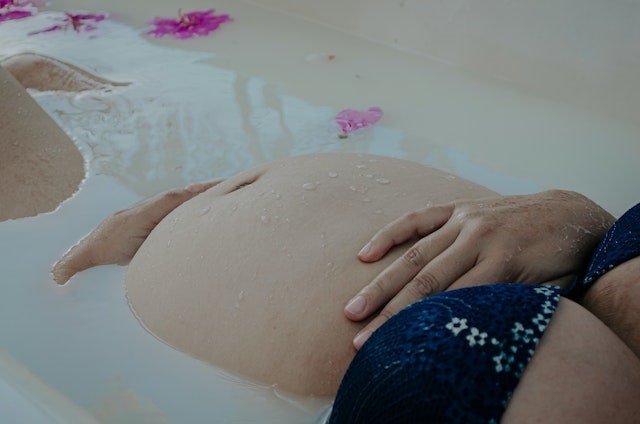Pregnancy can be an exciting yet challenging time for expectant mothers, with numerous questions arising about what is safe and what is not. One such concern that often crosses their minds is whether taking hot showers during pregnancy is safe.
This article seeks to shed light on this topic, by examining the connection between pregnancy and hot showers, and the potential risks involved.
It is important to understand that while hot showers may provide relaxation and pain relief to pregnant women, they could be potentially harmful if the water temperature is too high.
These potential risks may include overheating, dehydration, and an increase in the pregnant woman’s core body temperature, potentially impacting the developing baby. Therefore, it is crucial to take safety measures and precautions while taking a shower, and seeking advice from health professionals if needed.
Key Takeaways
- Hot showers during pregnancy can be relaxing, but high water temperatures pose potential risks.
- Overheating, dehydration, and increased core body temperature are concerns to consider.
- Safety measures, consulting health professionals, and exploring alternatives help ensure a safe experience.
Understanding the Connection Between Pregnancy and Hot Showers

Taking hot showers during pregnancy is a common concern for many expectant mothers. It’s essential to understand the effects of hot showers on the body during pregnancy and how to maintain a safe shower temperature to ensure the health and well-being of both mother and baby.
During pregnancy, the body undergoes significant changes that can impact the way it regulates temperature. An increased blood flow helps to dissipate heat, but a pregnant woman’s core body temperature still remains slightly higher than usual.
This increase in body temperature can make expectant mothers more vulnerable to heat-related issues, including heatstroke and dehydration.
Hot showers can raise core body temperature even further. Prolonged exposure to high water temperatures can also cause blood vessels near the skin to dilate, which may result in a reduction in blood flow to the fetus.
In some instances, this can lead to complications such as dizziness, fainting, or even low birth weight.
To maintain a safe shower temperature, experts recommend that pregnant women should avoid water temperatures above 100°F (38°C). This temperature will help ensure that the body does not overheat and that blood flow remains sufficient for the developing baby.
Keeping showers relatively short, around 10 to 15 minutes, is also a good practice during pregnancy to avoid excessive heat exposure.
In conclusion, while hot showers might provide comfort and relaxation during pregnancy, it’s important for expectant mothers to be cautious about the water temperature and duration of their showers.
By being aware of potential risks and adopting safe shower practices, pregnant women can enjoy a healthy and comfortable pregnancy.
Potential Risks of Hot Showers During Pregnancy
During pregnancy, it is essential to pay attention to a variety of factors affecting the health of the expecting mother and her unborn child. One such factor is taking hot showers, which might carry some potential risks.
In this section, we will discuss a few possible concerns associated with taking hot showers when pregnant.
Hyperthermia: Exposing the body to high temperatures during pregnancy might lead to hyperthermia, which is a significant increase in body temperature. This condition can affect the developing fetus, in particular during the first trimester; thus, increasing the risk of birth defects and neural tube defects.
Miscarriage and Preterm Labor: Prolonged exposure to high temperatures, such as in hot baths or showers, can also be linked to an increased risk of miscarriage or preterm labor, especially during the first trimester.
Early labor is associated with complications for the baby, so it is crucial to avoid any factors that may contribute to its onset.
Urinary Tract Infections (UTIs): Pregnant women are more susceptible to UTIs due to hormonal changes and the expanding uterus pressing on the bladder. Hot showers can potentially introduce bacteria or prolong an existing infection, leading to a higher likelihood of developing a UTI.
Infection Risk: While hot showers can be relaxing, spending excessive time in warm, humid environments may result in the growth of bacteria and fungi, increasing the risk of infection. Pregnant women should take care to limit their exposure to such environments to reduce the likelihood of infection.
It is important to note that these risks can be minimized by keeping the water temperature at a comfortable level that does not overly elevate the mother’s body temperature.
Pregnant women should aim to keep their showers short, warm, and relaxing, avoiding high heat settings and employing other methods for self-care and stress relief.
In conclusion, while taking a hot shower during pregnancy may pose some potential risks, these can be mitigated by using caution and remaining attentive to water temperature and duration. By doing so, expecting mothers can still enjoy the benefits of showers as part of a healthy pregnancy routine.
Consulting Health Professionals
Pregnant individuals often experience various physical and emotional changes. It is essential to consult with the appropriate healthcare providers, such as an obstetrician (OB), doctor, or midwife, as they can offer guidance and expertise tailored to the individual’s specific needs and risks.
This includes seeking input on topics like taking hot showers during pregnancy.
Medical professionals are aware of the latest studies and data relevant to the effects of hot showers on pregnancy. By discussing their concerns and getting proper medical advice, pregnant individuals can make informed decisions, prioritizing their health and their baby’s well-being.
It is essential to maintain clear communication with healthcare providers, as every pregnancy is unique. They can offer personalized recommendations based on medical history, current health status, and potential risks during pregnancy.
Pregnant individuals should not hesitate to ask for clarification or request additional information, as healthcare providers are there to support their journey towards a healthy pregnancy.
By consulting with health professionals and following their guidance, pregnant individuals can be confident in making the right choices for themselves and their baby.
As a neutral and trustworthy source of information, healthcare providers are crucial in ensuring that decisions are made with a clear understanding of the potential benefits and risks involved.
Alternatives to Hot Showers for Relaxation

Taking a warm bath can be a safe and effective alternative to hot showers during pregnancy. It provides a comforting environment that allows pregnant women to relax and ease sore muscles. The temperature of the warm bath should not exceed 100°F (37.8°C), as overheating could pose risks for both the mother and the baby.
Aromatherapy is another way to help pregnant women relax without using hot water. Essential oils like lavender, chamomile, and ylang-ylang can be added to the bath to create a soothing atmosphere.
These oils are safe to use during pregnancy, but it’s essential to use them sparingly and ensure they are properly diluted.
Epsom salt baths can also provide relief from muscle aches and pains, often experienced by pregnant women. Adding one to two cups of Epsom salts to the bathwater can support relaxation and help reduce swelling in the body.
It is essential to check with a healthcare provider before starting Epsom salt baths to confirm they are safe for individual circumstances.
Incorporating bath oils can further enhance the bath experience. Oils like almond, coconut, or even olive oil can be used to moisturize the skin and create a luxurious bath.
When choosing bath oils, it is crucial to select ones that are safe for use during pregnancy and free from harmful ingredients.
In summary, warm baths, aromatherapy, Epsom salt baths, and bath oils offer safe and effective alternatives to hot showers for relaxation during pregnancy. Pregnant women can indulge in these soothing practices, ensuring their well-being and the safety of their babies.
Safety Measures and Precautions
Taking hot showers while pregnant can be a source of relaxation and comfort, but it is crucial to be aware of the safety measures and precautions to ensure a healthy environment for both the expecting mother and the baby.
It’s important to keep the water temperature at a safe level and monitor it to prevent any complications or risks related to excessive heat exposure.
One of the essential tools that can help you maintain a safe water temperature is a thermometer, specifically a bath thermometer. This simple device allows you to accurately measure the water’s temperature while filling the bathtub or shower.
Ideally, water temperature should not exceed 100°F (37.8°C) to avoid raising the expectant mother’s core body temperature, which can potentially harm the baby, particularly during the first trimester.
While taking hot showers, it is beneficial to apply some precautions such as limiting the time spent in the shower and maintaining proper hydration. Pregnant women are advised to take shorter showers, around 10-15 minutes, and avoid taking hot showers daily.
Staying hydrated by drinking plenty of water before and after the shower helps replenish fluids lost due to sweating and reduces the risk of overheating.
Epsom salt, also known as magnesium sulfate, can be used in baths as a complementary measure, providing benefits such as reduced muscle tension, relief from aches and pains, and gentle skin exfoliation.
However, it is important to consider individual sensitivities to bath salts and consult with a healthcare provider before using Epsom salt in baths during pregnancy. Pregnant women may be advised to start with a lower concentration and gradually increase the amount, as needed, based on their comfort level and tolerance.
To summarize, taking hot showers while pregnant can be a relaxing experience, but it requires careful attention to safety measures and precautions.
Using a bath thermometer, limiting shower time and frequency, maintaining proper hydration, and consulting a healthcare provider about the use of Epsom salt can help ensure a safe and comfortable experience for both the mother and baby.
Impacts of Other Heat Sources on Pregnancy

Exposure to high temperatures can have several effects on pregnant women and their developing babies. While hot showers are generally considered safe, it is crucial to be aware of other heat sources that can cause potential harm during pregnancy.
Hot tubs and saunas: Both hot tubs and saunas may elevate a pregnant woman’s body temperature to unsafe levels. Prolonged exposure to extreme heat can lead to a higher risk of neural tube defects in the first trimester, and other complications such as dehydration and low blood pressure.
It is advisable to avoid hot tubs and saunas or to limit the time spent in them to 10 minutes or less.
Steam baths: Similar to saunas, steam baths generate high humidity combined with heat, potentially causing overheating in a pregnant woman’s body. To reduce the risk of complications, pregnant women should be cautious and limit their time in steam baths.
Hot weather: Pregnant women must be vigilant in staying cool and hydrated during hot weather. Overheating and dehydration can lead to complications such as preterm labor. It is essential to drink plenty of water, wear loose and breathable clothing, and take breaks in air-conditioned or shaded areas.
Hot water immersion: Water immersion can help relieve the discomfort associated with pregnancy, but exposing the body to hot water for prolonged periods can be dangerous. Pregnant women should ensure the water temperature is comfortable and not too hot.
It is also essential to avoid sudden temperature changes, as this might cause dizziness or fainting.
In summary, pregnant women should take necessary precautions when exposed to high temperatures or other heat sources, considering the potential risks and complications that may arise.
Staying informed and cautious during pregnancy can help ensure the well-being of both the mother and the developing baby.
Understanding Specific Conditions and Complications
Taking hot showers during pregnancy can be soothing and relaxing, however, there are specific conditions and complications that need to be considered, to avoid any potential harm to the expectant mother and the baby.
Hot showers can cause irritation and vaginal irritation in some women, especially if they have sensitive skin. This can result in distress for the mother, and if the irritation becomes severe, it may even lead to allergic reactions.
It is essential to monitor your skin’s reaction to hot showers and adjust the temperature accordingly.
Another complication that can arise from hot showers during pregnancy is swelling in the legs, ankles, and feet. The heat from the shower relaxes the blood vessels and can exacerbate water retention.
To avoid this issue, pregnant women should limit the duration of hot showers and try elevating their legs afterward.
Hemorrhoids are a common problem during pregnancy, and hot showers can increase their discomfort. The warmth of the water may cause these inflamed veins to swell more and cause additional pain.
Pregnant women with hemorrhoids should opt for a warm, not hot, shower to prevent aggravating their condition.
Standing for a long time under a hot shower can cause dizziness, affecting the mother’s balance. Pregnant women should ensure that they maintain a comfortable temperature and have a stable surface to lean on if needed.
An excessively high temperature during a shower can induce fever-like symptoms in pregnant women, which may harm the baby. Therefore, it is crucial to ensure that the water’s temperature does not exceed a level that might cause a feverish sensation.
Finally, hot showers can contribute to the development of vaginal infections such as yeast infection and thrush. A warm and moist environment is conducive to the growth of these fungi.
Pregnant women should take caution, ensuring that their showers are not too hot and that they dry off thoroughly afterward.
In conclusion, it is essential for pregnant women to be aware of these specific conditions and complications when taking hot showers.
By understanding these potential issues and taking the necessary precautions, they can continue to enjoy the comforting experience without putting their health or their baby’s well-being at risk.
Possible Impact on Baby

Pregnancy is a delicate time for both the mother and the developing baby. Many factors can affect the baby’s health, and one such area of concern is whether taking hot showers can have any adverse effects.
This discussion aims to provide a clear and confident understanding of the possible impacts on a baby due to hot showers during pregnancy.
One of the potential risks of exposing the fetus to high temperatures is neural tube defects. Neural tube defects are birth defects in the brain or spinal cord that can lead to conditions such as spina bifida and anencephaly.
These defects can occur during the early stages of pregnancy when the baby’s neural tube forms and closes. Studies have shown that exposure to high temperatures can interfere with this process, increasing the likelihood of these defects.
Hot showers, particularly those with temperatures above 101°F (38.3°C), can cause the mother’s body temperature to rise. This increase in body temperature is known as maternal hyperthermia.
Maternal hyperthermia has been linked to an increased risk of gastroschisis, a congenital defect in which a baby is born with part of the intestine exposed outside the body.
Elevated body temperatures during pregnancy might also adversely impact other aspects of fetal development, including growth and organ formation.
It is important to note that the risks associated with hot showers during pregnancy are generally considered low, especially if the temperature stays within a safe range and exposure duration is kept short.
Expectant mothers should still be cautious and monitor the temperature and length of their showers to minimize any potential risks to their baby’s health.
In conclusion, there is evidence suggesting that taking hot showers during pregnancy could pose some risks to the developing baby, such as neural tube defects, gastroschisis, and other developmental abnormalities.
Pregnant women should take care to maintain a safe temperature and short duration for their showers to minimize these risks.
Also, check out some related post:
Frequently Asked Questions
Are hot showers harmful during pregnancy?
Hot showers are generally safe during pregnancy, but it is essential to keep the water temperature at a safe level. Extremely hot water can raise a pregnant woman’s body temperature, potentially causing harm to the developing baby.
What is a safe temperature for showers during pregnancy?
A safe temperature for showers during pregnancy is around 98.6 to 100 degrees Fahrenheit (37 to 38 degrees Celsius). This temperature is warm but not hot enough to cause a significant rise in body temperature.
How long can I shower with hot water when pregnant?
It is advisable to limit hot showers to 10-15 minutes during pregnancy. Prolonged exposure to high temperatures can lead to overheating and potential risks for the baby.
Do hot showers pose risks during the first trimester?
Yes, hot showers can pose risks during the first trimester. Overheating or raising core body temperature during the first trimester may increase the risk of neural tube defects in the developing baby.
What are alternative ways to relax during pregnancy?
There are several alternative ways to relax during pregnancy, including prenatal massages, meditation, deep breathing exercises, and other gentle activities such as yoga and stretching. It’s important to choose relaxation methods that are both soothing and safe for both the mother and the baby.
Can hot showers affect the second and third trimesters?
While hot showers are generally safe during the second and third trimesters, it’s still essential to avoid overheating. Increased core body temperature can lead to dehydration and could potentially impact the baby’s development.

Iesha is a loving mother of 2 beautiful children. She’s an active parent who enjoys indoor and outdoor adventures with her family. Her mission is to share practical and realistic parenting advice to help the parenting community becoming stronger.
